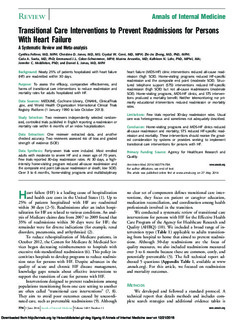Transitional Care Interventions to Prevent Readmissions for Persons With Heart Failure: A Systematic Review and Metaanalysis
Feltner, C.; Jones, C.D.; Cené, C.W.; Zheng, Z.-J.; Sueta, C.A.; Coker-Schwimmer, E. J. L.; Jonas, D.E.
Journal article

Åpne
Permanent lenke
http://hdl.handle.net/11250/2485759Utgivelsesdato
2014Metadata
Vis full innførselSamlinger
Originalversjon
Feltner, C., Jones, C. D., Cené, C. W., Zheng, Z.-J., Sueta, C. A., Coker-Schwimmer, E. J. L., . . . Jonas, D. E. (2014). Transitional Care Interventions to Prevent Readmissions for Persons With Heart Failure: A Systematic Review and Metaanalysis. Annals Of Internal Medicine, 160(11), 774-784. 10.7326/M14-0083Sammendrag
Background: Nearly 25% of patients hospitalized with heart failure (HF) are readmitted within 30 days.
Purpose: To assess the efficacy, comparative effectiveness, and harms of transitional care interventions to reduce readmission and mortality rates for adults hospitalized with HF.
Data Sources: MEDLINE, Cochrane Library, CINAHL, ClinicalTrials.gov, and World Health Organization International Clinical Trials Registry Platform (1 January 1990 to late October 2013).
Study Selection: Two reviewers independently selected randomized, controlled trials published in English reporting a readmission or mortality rate within 6 months of an index hospitalization.
Data Extraction: One reviewer extracted data, and another checked accuracy. Two reviewers assessed risk of bias and graded strength of evidence (SOE). Data Synthesis: Forty-seven trials were included. Most enrolled adults with moderate to severe HF and a mean age of 70 years. Few trials reported 30-day readmission rates. At 30 days, a highintensity home-visiting program reduced all-cause readmission and the composite end point (all-cause readmission or death; low SOE). Over 3 to 6 months, home-visiting programs and multidisciplinary heart failure (MDS-HF) clinic interventions reduced all-cause readmission (high SOE). Home-visiting programs reduced HF-specific readmission and the composite end point (moderate SOE). Structured telephone support (STS) interventions reduced HF-specific readmission (high SOE) but not all-cause readmissions (moderate SOE). Home-visiting programs, MDS-HF clinics, and STS interventions produced a mortality benefit. Neither telemonitoring nor primarily educational interventions reduced readmission or mortality rates.
Limitations: Few trials reported 30-day readmission rates. Usual care was heterogeneous and sometimes not adequately described.
Conclusion: Home-visiting programs and MDS-HF clinics reduced all-cause readmission and mortality; STS reduced HF-specific readmission and mortality. These interventions should receive the greatest consideration by systems or providers seeking to implement transitional care interventions for persons with HF.